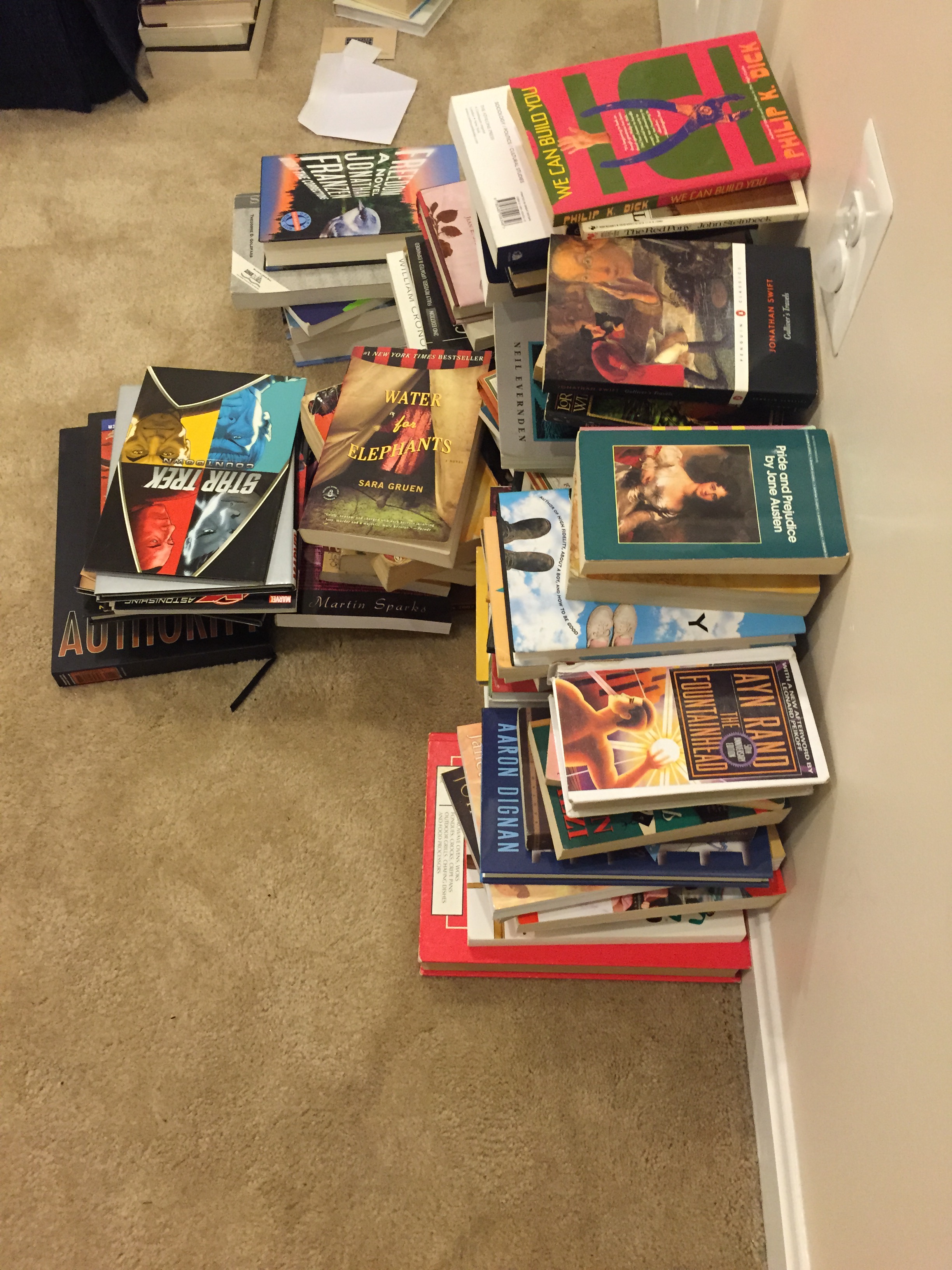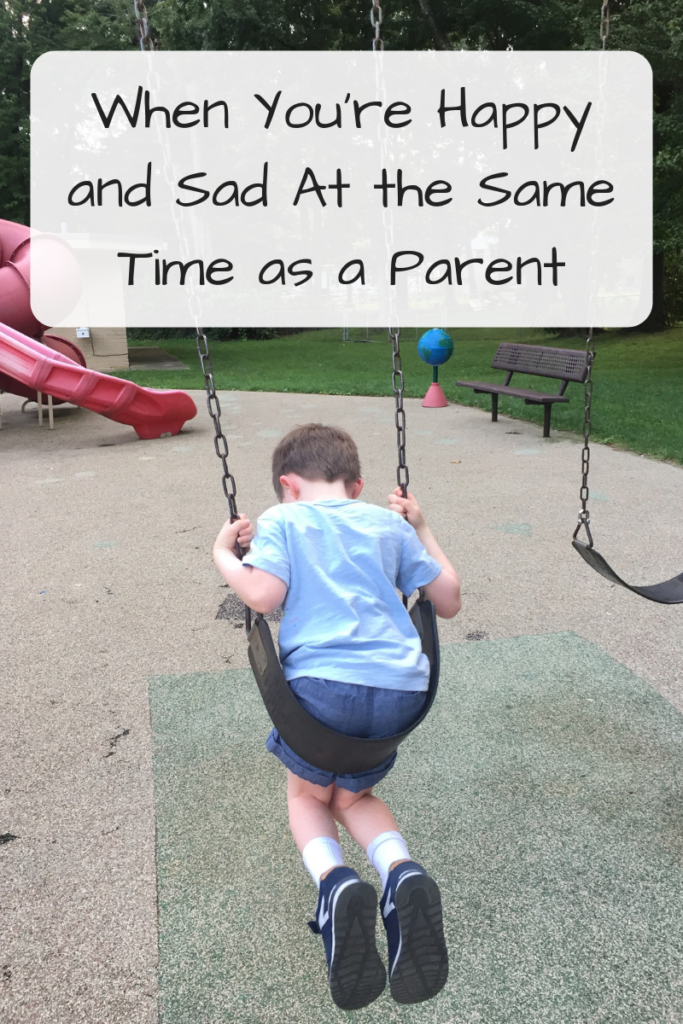I’m one of those people who always snoops in a person’s house by looking at their bookshelf. Unfortunately, ours has been a mess for years – unread books next to favorites next to grad school textbooks next to Chris’s collection of ginormous cookbooks. But in the ongoing process of organizing our study, the other day, Chris pulled all of the books off the bookshelf along with a large number in boxes and spread them on the floor of our basement. Much of my literary collection sat in seven piles, organized by genre. While I originally planned on going downstairs to merely formulate a plan of attack, we spent an hour and a half sorting through books, laughing and remembering.
Most of the books I kept were obvious, at least if you know me. Many were old favorites in SF (Slaughterhouse 5, The Martian Chronicles), graphic novels (V for Vendetta, Maus), and first person non-fiction (Traveling Mercies, The Omnivore’s Dilemma). Chris and I spent quite a bit of time discussing these, especially why we loved them so much. A few were college or graduate school books that I should keep for reference, like Visual Communication. Others were personal reference, such as those those on gardening, parenting, and community building. Any humor books specific to parenting that I could refer to for a laugh stayed. A few were kept for reasons unrelated to their re-readability, such as the fact they were signed, were relatively rare, or had a particular memory attached to them. I certainly wasn’t going to get rid of the love poetry book I gave Chris in high school or the non-fiction book about the community where I did my graduate thesis.
One of these nostalgia books in particular cracked me up. In high school, Chris sometimes forgot to return books to the teacher at the end of the year. While I was very glad to banish The Fountainhead from our shelves, I was baffled by Light in August. Who would assign Faulkner to high school students? Oh right – Mr. McCain, Chris’s Modernism teacher, who headed the teachers’ union, quoted Irish poets at random students in the hallway, and was one of my favorite teachers on reputation alone. Opening the book, we realized Chris was not the only student who had that book in their presence. Inside the front cover was the name of one of our other good friends from high school! Turns out, she didn’t read it either.
Of the unread books, both the books I kept and those I discarded say quite a bit about me – both who I was then and who I am now. I kept a number of “high-faluting” classic fiction books, even if my desire to read them is aspirational at best. I may not tackle James Joyce’s Ulysses until I retire, but it would still feel like a defeat to remove it from my library. Others were foundational texts in science communication that I feel like I “should” read, like A Brief History of Time. Too bad I’ll never have time to read it at work as professional development. Still others, like The Experts’ Guide to 100 Things Everyone Should Know How to Do and Simplify Your Life remained in the keep pile out of the vaguely desperate hope that “reading this will make me feel like more of an adult.” Like many people, I frequently suffer from Imposter Syndrome and stave it off by trying to gain new skills. It doesn’t actually work, but at least I’ve learned something. Lastly were the “fun” books (mostly in the aforementioned genres) that I just haven’t gotten around to reading due to my voracious Internet reading habit and my own writing.

While that sounds like a lot, I dumped a substantial amount too. I said goodbye to a number of academic books that I will simply never reference, like a huge tome on Wetlands. I suspect that even if I got a communications job in the Environmental Protection Agency’s wetlands division that I could refresh myself on the needed knowledge from my colleagues and the Internet. Others in the pile were gifted and free books that attracted me with their lack of price, but offered little else. I kept them for so long because they were free, but they were taking up more room than I could afford. A few were aspirational books that after taking a long, hard look, I decided I didn’t actually want to read. Should I give Pride and Prejudice another chance after not liking it when I was 14? Probably. Do I want to? Not really. But I did keep Pride and Prejudice and Zombies.
Not all of the books were mine, of course. Chris refused to give up any of his cookbooks, no matter how ridiculous they are. (Yes, we do have a Thomas Keller cookbook. No, we have never cooked from it.) Sprout’s bookshelf just keeps growing, supplemented regularly by books my mom bought for her classroom and then brought home when she retired.
But the large majority of them were mine, reflecting my literary history and tastes. It’s amazing how much you learn about yourself when you take a long, hard look at your own bookshelf.

 When I close my eyes during Christmastime, I see my parents’ house, with its fresh tree with white twinkling lights, ornaments from my childhood dangling off it. My dad has classic rock on in the background, either from an ancient speaker system or the TV, depending on what memory I’m drawing from. In the kitchen, my mom is making a gingerbread house with my older son, placing marshmallows just-so.
When I close my eyes during Christmastime, I see my parents’ house, with its fresh tree with white twinkling lights, ornaments from my childhood dangling off it. My dad has classic rock on in the background, either from an ancient speaker system or the TV, depending on what memory I’m drawing from. In the kitchen, my mom is making a gingerbread house with my older son, placing marshmallows just-so.


